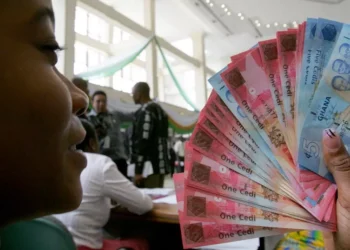The GCB Bank PLC has released its 2022 financial statement where the bank made huge losses before tax despite making huge profit in the previous year. However, the bank blamed the government of Ghana’s debt exchange programme for the losses.
According to the financial statement, GCB Bank recorded a Loss Before Tax of a whopping GHS743.5 million in 2022 compared to a Profit before Tax of GHS832.0 million in the prior year.
According to the statement, this loss is largely due to the impairment loss on investment in government securities of GHS1.8 billion. “It is worth noting that our projected profit for the Year 2022 without the impairment would have been in excess of GHS1.0 billion,” the statement said.
However, in the year 2022, customer deposits grew by 28% from GHS13.9 billion in 2021 to GHS17.8 billion in 2022. The bank expressed appreciation to the customers. “We are eternally grateful for the business of our cherished customers. Our balance sheet remained strong, growing from GHS18.4 billion in 2021 to GHS21.5 billion in 2022”.
Moreover, total equity of the Bank declined by 39% from GHS2.7 billion in 2021 to GHS2.0 billion in 2022 on the back of impaired investments in securities due to the DDEP.
In the broader sense, the statement noted that in the Banking industry, total assets of the industry stood at GHS209.4 billion in December 2022, representing a growth of 16.4 percent, attributable to growth in deposits and currency translation effect.
Total credit increased by 28.5 percent to GH69.1 billion in December 2022 from GHS53.8 billion in December 2021. Total deposits stood at GHS157.9 billion, representing an increase of 30.4 percent year-on-year, compared with 16.6 percent recorded during the same period in 2021.
In all, the Bank generated a record revenue of GHS3.0 billion representing an increase of 24% or GHS578.2 million compared to 2021. The growth was mainly driven by 11% increase in Net Interest Income and a 7% rise in Net fees and commissions.
Net Trading income was up by 209% largely from margins from foreign exchange trading on account of currency volatility. The Net Interest Income contributed 70% of our total revenue with the Non- Interest Income accounting for the remaining 30%.
Operating expenses increased by 29% largely due to cedi depreciation against the USD and the surge in inflation to 54.1% from 12.6%. These resulted in a cost to income ratio of 54.4% in 2022 compared to 52.6% in 2021.
DDEP Results in Significant Impairment Loss on Investments
The statement explained that the DDEP resulted in significant impairment loss on investments in government securities and consequently a deterioration in the capital position of banks. In order to mitigate the impact on the banking sector, the Bank of Ghana introduced regulatory forbearance on capital.
It Is against this background that the bank evaluated the programme focusing on the best options open to it.
The bank noted that the DDEP was an invitation for the voluntary exchange of about GHS130 billion of the domestic bonds of the Republic for a package of new bonds with lower coupons and longer tenors. The program is part of a comprehensive strategy aimed at bringing the public debt stock back to sustainable level and to unlock financial assistance from the International Monetary Fund (IMF).
The Bank exchanged a total amount of GHS6.784 billion being the value of Eligible Bonds under the DDEP. Under International Financial Reporting Standards shortfalls in the recoverable amounts of financial assets are required to be reflected in the income statement as an impairment charge. The Bank’s participation in the DDEP resulted in an impairment loss of GHS1.8 billion for the year.
The Bank, due to the adequate build-up of retained earnings in the past, was able to absorb the impairment loss and maintain an adequate capital buffer with regulatory forbearance. The Board reviewed the risk weights attached to the new bonds and noted the potential of illiquidity in the market for bonds which were subject to be exchanged.
Against this background and the relevance of the DDEP as a critical component of the debt reduction program and the IMF programme, the board concluded that participation in the DDEP was in the best long-term interest of the Bank and its shareholders.
As such, the statement said the Bank accordingly, participated in the DDEP, to preserve value to shareholders, reinforce its competitive advantage and secure the future of the Bank.
That notwithstanding, the bank explained that the minimum Capital Adequacy Ratio (CAR) required to be maintained by banks was reduced from 13 percent to 10 percent as of 31st December 2022, and losses from the DDEP are to be reflected in the computation of CAR over a period of up to three (3) years.
The average capital adequacy ratio for the industry was 15.7 percent in December 2022 largely supported by the regulatory reliefs, compared with 16.6 percent as of December 2021 without the DDEP





















